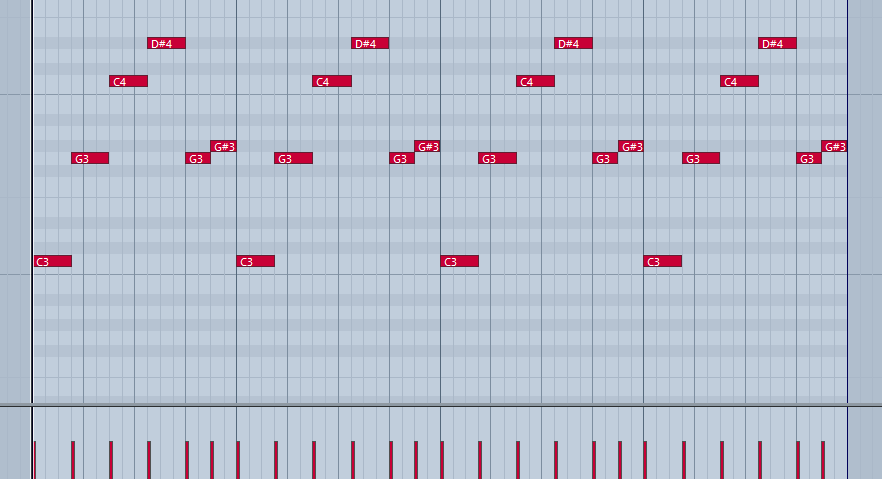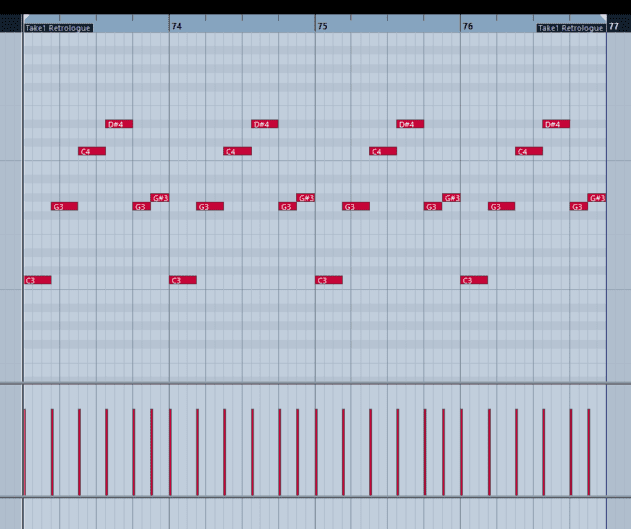4 – Bass As Lead
So far our basslines have nudged into melodic territory, but there’s a whole class of tracks where the bass well and truly steals the melodic show.
A classic early house example can be found on Mr Fingers’ timeless ‘Can You Feel It’, where the track is predominantly about kick and bass:
The combination of a simple octave-spanning note pattern and Roland Juno-6 patch running through the classic Juno chorus sits at the core of this track. The pads help provide overall momentum.
A year later, another Chicago outfit, Phuture, took an even more minimalist approach with ‘Acid Tracks’, a paean to the power of the Roland TB-303 and little else (well, a TR-707 and TR-727 on basic rhythm duties):
https://www.youtube.com/watch?v=JCUPc9zVfyo
One critical aspect that this track brought with it was the fact that, although the notes themselves remained the same throughout, the sound itself underwent continuous tweaking. Josh Wink took a broadly similar approach on his ‘Higher States of Consciousness’:
https://www.youtube.com/watch?v=Y9gWA491H4U
The 303 itself has a very simple synth section where most of the knobs are devoted to changing the way the filter shapes a single sawtooth or square wave. Filter cutoff, resonance, envelope modulation and envelope decay – that’s it.
Even without a 303 or Juno we can put some of these techniques into practice.
Audio Player Audio Player Audio Player Audio Player Audio PlayerThis layering of tonal elements playing the same thing at different octaves works across a wide range of genres. One only has to look at recent pop/EDM tracks to witness this.
The use of the bass to fill out the higher octaves and still address the low end was of course used to enduring effect on Donna Summer’s ‘I Feel Love’:
Here Giorgio Moroder takes a simple 8th-note alternate octave bass and feeds it into a single repeat tempo-locked delay that turns the pattern into a hypnotic 16th-note pulse. The bass progresses very slowly through a four note progression during the verses, and then switches to quicker changes (one per bar) in the chorus. All the time these stick to the root of the overlying chords.
It’s not just analogue synths that get a look-in here. Just check out the all digital Korg bass/lead organ on MK’s remix of Nightcrawlers ‘Push The Feeling On’ or the seminal ‘Show Me Love’ by Robin S.
A more recent example of the ‘bass as lead’ approach can be found in the Detroit flavours of Omar-S’s ‘Thank U 4 Letting Me Be Myself’, where pads and keys add subtly to the stronger melodics of the bass part:


11.07 PM
Easily one of the most informative articles ever on basslines, what a godsend!
01.11 PM
So good! Thanks, attackmagazine!
01.59 PM
Nice. A top educational post.
05.04 PM
This is awesome!! Thanks!!
11.22 AM
Great post. I will come back many many times to check this post again 🙂
12.41 PM
Great article & some really useful info there, I like the way you educate as you are explaining instead of the usual spoon feeding that goes on these days. I’ve been doing music for 20 years or so & still learnt & picked up some inspiration from this, thanks.
06.19 AM
Great article! Thanks!
06.58 PM
Nice!
07.02 PM
Wow! super article. very informative and well researched with lots of examples. Love it. Thank you
06.12 AM
You forgot the Reverb Bass used in Dark Techno tracks.
09.12 AM
hey guys!! as always great tutorial for every type of producer 🙂 Could you tell me which delay you used for this work? I can’t find these one with only the name relayer delay vst. Thank you
11.35 AM
John, that’s UVI Relayer http://www.uvi.net/en/software/relayer.html
08.53 PM
Fantastic explanations, thanks guys.
02.20 PM
Brilliant article! It would be great if you could put all these articles in a book or app format similar to what Sample Magic have done
08.32 PM
Much obliged attack magazine !
04.23 PM
Forget all those Youtube videos 🙂 Attack brings to the point…
03.44 PM
nice beats
04.52 AM
Great article!! I guess there’s another one: those subby techno lines with lfo on pitch
06.21 PM
well explained, systematically, without frills
well done!
06.20 AM
Well done! Good information and great examples!
01.54 AM
Have not read a better article on low end theory. Thank you Attack!